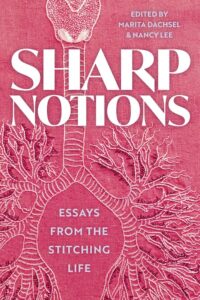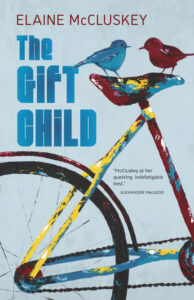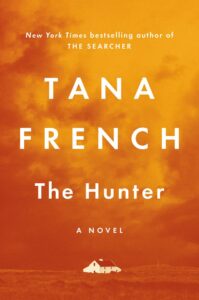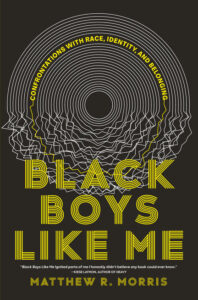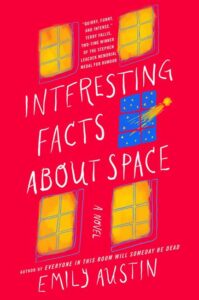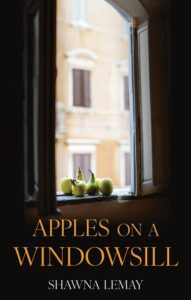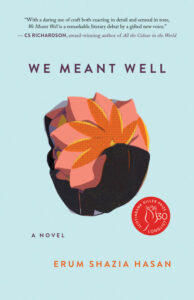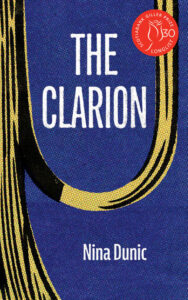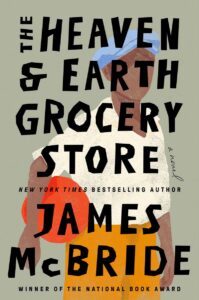March 28, 2024
Sharp Notions: Essays from the Stitching Life, edited by Marita Dachsel and Nancy Lee
I’ve been around for a little while, and I think it’s safe to say that Sharp Notions: Essays from the Stitching Life, edited by Marita Dachsel and Nancy Lee is the best literary anthology I’ve ever read. It’s a beautiful volume, as aesthetically as pleasing as you’d expect for a book about art, a beautifully crafted object in its own right, complete with colour photography of beadwork, quilts, Kelly S. Thompson’s knitted bull terrier, a conversation in embroidery, and needlepoint.
I’m not actually sure of what the difference is between embroidery and needlepoint (I’m a lapsed knitter myself, without much of a stitching life at all) but I still really loved this book, the different approaches of its essayists, the capaciousness of “the stitching life” in general and its connection to many different backgrounds and traditions, which means that every reader has something new, and fresh, and inspiring to say.
A common thread (oh, no. I’ll stop…) is the way that various kinds of stitching have sustained the writers through periods of difficulty, how needle crafts have managed to be transportive at moments when the crafters themselves weren’t going anywhere. My favourite piece was Jess Taylor’s, a meditation on pain, healing, trauma, and productivity. I loved Anne Fleming on knitting and gender; Danielle Lussier on bringing Indigenous beading traditions to her PhD thesis; Laura Cok on infertility and knitting for a pregnant friend’s baby; Lorri Neilsen Glenn on the stitches that have been with her throughout her life; Rob Leacock on knitting as a way to be alone; Carrianne Leung on stitching her way through pandemic days; and Theresa Kishkan (such a beloved writer!) on stitching through uncertainty.
These essays are stories of connection, with the past, present, and future. Stories of creation, solace, and possibility. These are stories of kinship, and it’s a privilege to join the fold through reading.
March 18, 2024
The Gift Child, by Elaine McCluskey
With her seventh book, The Gift Child, short story superstar Elaine McCluskey has pulled off a novel that’s as great as one of her sentences, which is saying a lot. It’s a novel in the form of a memoir by Harriett Swim, a photojournalist who lost her career when the bottom fell out of the industry, and lost her marriage around the same time for reasons she’ll eventually make clear, which is also to say that she is struggling. Age 52, she’s returned to her hometown of Dartmouth, NS, where she’s got a job at the casino and can’t help getting sucked into the vortex of her father, Stan, iconic news anchorman, philanderer, narcissist, pathological liar, and jerk. But does the story of what’s wrong with Stan and all his various crimes have to do with who Harriett is? And what about her cousin Graham, a bit slow, last seen riding a bicycle with a giant tuna head in the basket and missing ever since? What if it’s easier to get to the bottom of the mystery of what happened to Graham, what happened to Stan, than to unpack the reality her own trauma and heartaches? (“Focusing, as people often do, on the peripheral, because the real problem was too unmanageable.”) What if family ties weren’t necessarily destiny? But then, if that were true, what would explain it all? What stories would we tell?
This is a novel ostensibly made of bits and pieces, and diversions, but it’s also fundamentally a poignant journey to the heart of things. Further, it’s an assemblage of the weird and wonderful—aliens; Dartmouth separatists; an exploration of the culture of “paddling,” which I never even knew was a sport; off-colour adventures of the down and out; the crime beat; Russian spies, and hockey heroes. I loved it all so much.
March 8, 2024
The Hunter, by Tana French
Tana French is my favourite. Her new novel, The Hunter, is the second book in her new series featuring Cal Hooper, a retired Chicago detective who buys a rural home in the west of Ireland to discover that the big city’s got nothing on the village of Ardnakelty in terms of darkness and depravity. I read the first book, The Searcher, in 2020 and then forgot everything about it, but no matter because The Hunter doesn’t require a reader to be wholly up to date. And I will likely forget everything about The Hunter too because, as with when I read any mystery novel, but especially Tana French’s, I’m more just steeped in the atmosphere than sorting through the details. And the atmosphere is HEIGHTENED in this latest release, set during a sweltering summer as crops fail and everyone’s on his very last nerve. Cal has created a healthy relationship with local teen Trey Reddy, but it’s all set to go awry when Trey’s father reappears after years away in the company of an Englishman who’s probably not what he seems, and when the locals try to pull one over the both of them, it might just be that they’re being swindled themselves, and just when Cal thinks he’s got a handle on things, a dead body turns up in the road on the mountain. Could not love it more. My only complaint is that now I can’t stop saying “Feck.”
February 13, 2024
Black Boys Like Me, by Matthew Morris
Three pages into the first essay in Matthew Morris’s new collection BLACK BOYS LIKE ME: CONFRONTATIONS WITH RACE, IDENTITY, AND BELONGING, and I was hooked, as Morris describes a 4am journey through Brooklyn, the way he adapts his performance of self as he passes a police station (“stage my innocence”) versus how he would have acted if he’d run into another Black man on the subway who presents himself in public as Morris does (“I would have amplified my Blackness—for survival”). The former I could have discerned, but I’d never considered the latter—how racism and anti-Blackness could be as pervasive as that.
I loved this book, each essay blowing my mind a bit, framing the familiar in ways that are new to me. How does Morris, as a Black middle-school teacher, get dressed to go to work in the morning, and how are his fashion choices judged in comparison to those of his white colleagues? (What is “professionalism” anyway? What kind of people get to “profess”?) “Still, how are the Jordans I chose to wear to work less professional than the boat shoes Tanner rocked?” He writes about his mom buying him a Snoop Dogg CD when he was nine at the Sunrise Records at Cedarbrae Mall, and what hip hop has meant as a reflection of Black identity when there is so little representation of Black masculinity in pop culture otherwise, but what was complicated about that: “Those rappers were me, but that didn’t mean I was them. Outsiders couldn’t see the difference.” About pursuing his dream of NFL stardom, and the what that pursuit did to his body—he connects the distribution company where his dad worked (and where Morris and his brother worked the summer before he left to play football in Ohio), a company where the workers on the floor were all people of colour, and management was white, to professional sports where white owners reap their fortunes from the bodies of Black athletes. Though the connection is made implicitly, and this is the art in these essays, Morris laying out the evidence and letting the facts speak for themselves.
And herein lies the artistry at work here, in terms of structure, and prose that calls attention to itself in the most vivid and compelling way. I’m going to suggest that that first Snoop Dogg CD was the beginning of an education in the poetics of hip-hop, and that the influence of that poetics is discernible on every page of this book. Although I feel like I’ve never been more middle-aged white lady as when I’m supposing I can discern the influence of hip hop, um, anywhere, but there is just such a rhythm and a feel to Morris’s sentences, their cadences and alliteration. And then I think of the essay “The Fresh Prince Syndrome,” teenage Morris performing Will Smith’s character in school…because the alternative was being Carlton and alienated from his peer group, and I think of the high school teachers who wrote Morris off for being the smartass Black kid mouthing off in the back of the classroom, and is my supposing the influence of hip-hop similar to that, as opposed to a more traditional kind of literary influence? (What is tradition? Who gets to tradish?)
A thread running through all these essays is Morris’s relationship to his family, especially his mother (who was white, with a Polish-Jewish background—interesting to encounter not long after reading James McBride’s memoir THE COLOUR OF WATER), and—more subtly, but essentially—his younger brother, whose trajectory of life as a Black man would be wildly divergent from Morris’s for awhile. While Morris pursues his football scholarship dreams, his brother gets involved with drugs, with drug dealing, and eventually winds up in prison. “Despite thirty years spent knowing and touching and loving each other, we couldn’t be further apart in the routes we’d taken to preserve the collective sense of what Black masculinity meant to us. Of what Black boyhood had meant.”
BLACK BOYS LIKE ME is a complicated work with multitudinous facets, and every one of these surfaces shines. This book is a celebration and a gift.
February 5, 2024
As Long as the Lemon Trees Grow, by Zoulfa Katouh
It is impossible to read As Long as the Lemon Trees Grow—the debut by YA author Zoulfa Katouh, a 2023 CCBC book award-winner, an OLA White Pine nominee, and a finalist for the 2023 Governor’s General Awards—and not think about what’s happening right now in Gaza. Set over a decade ago in the city of Homs, during Syrian Civil War, the novel is about Salama, who—by virtue of having completed a year of pharmacy school—has stepped up to volunteer at a local hospital, removing shrapnel from people’s bodies, performing amputations without anaesthetic, saving whatever lives she can manage to save, which will never be enough, because she can’t save all of them.
Salama welcomes the distraction of her work at the hospital, which at least feels useful, and takes her mind away from not only the existential threat of death by bombs or snipers at any time, but also the figure of Khawf, an embodiment of her PTSD since the death of her mother and her father and brother’s capture by government forces. But she also feels responsible for her pregnant sister-in-law, who is also her oldest friend, and has not forgotten the promise she’d made to her brother to keep Layla safe, and she is trying to secure passage for her and Layla to make the journey across the Mediterranean Sea for asylum in Europe, though the journey is fraught with risk and Salama is ambivalent about leaving Syria behind, and abandoning the revolutionary cause that had inspired uprisings throughout her homeland.
Woven into this story—almost impossibly, and so gorgeously—is a beautiful love story, as well as a brilliant ode to the transportive powers of imagination in general and the works of Hayao Miyazaki specifically, works that have shown how love and magic are possible in the most unlikely places.
And I do not want to gloss over the book’s specificity, in terms of place and story—this novel is a powerful ode to Syrian culture, a love letter to the place itself, and to the possibility of Syrian emigrants one day returning to the freedom that so many have rallied, fought, and died for.
But it is also such an urgent call for the necessity of a ceasefire in Gaza right now, a testament to the suffering through which so many people are living…and dying. A few weeks ago, I read the words of a doctor in Gaza who’d amputated his own child’s leg on his kitchen table, and I just fell to pieces imagining being in such a situation myself: my child, my table. What’s the difference between him and me? What’s the difference between *this*—caring for children who are victims of chemical attacks, patients whose homes have been reduced to rubble, with babies left to die in their incubators because there are not arms enough to carry them all when the hospital has moments to evacuate before the building is bombed—and that one? This novel is a testament to the absurdity of there being any excuse for human beings to have to live this way, for any person to be so dehumanized that such depravity and barbarism is somehow justified. (Our current moment in which migrants are being vilified at border crossings around the world makes Salama’s story doubly, and even more tragically resonant.)
“If we weren’t in such a dire situation, this place would be beautiful. The blackness stretches out in front of us, with the moon casting his silvery glimmer, dimming the light of the stars nearby. It’s the same sky other people see in their countries. But while we watch it here, hiding, not knowing if our next breath is our last, others sleep safely in their beds, bidding the moon a peaceful good night.”
January 29, 2024
Interesting Facts About Space, by Emily Austin
I adored Emily Austin’s debut Everyone in This Room Will Someday Be Dead, which I recall reading during the sad pandemic summer of 2021 and being surprised by its capacity to delight me when not much else was doing the trick, and perhaps it was the mordant dread of its depressive protagonist that did it, her willingness to stare the absurdity of life’s darkness in the face—and be funny and achingly human all the while.
Austin’s sophomore novel, Interesting Facts About Space, is even better, the story of Enid, an information architect who works for the National Space Agency who texts her mother interesting facts about space whenever she worries about her, which is always. Because Enid’s mother has long struggled with her mental health, since Enid’s father left them when she was just a child, and Enid has made herself responsible for her mother’s well-being ever since, a Sisyphean task. Just one of many such tasks in Enid’s life, including finding connection on dating apps, overcoming her inexplicable phobia of bald men, resolving her fears that somebody is watching her and moving things around in her apartment when she’s not there, as well as establishing a relationship with her half-sisters, who she’s only just met since her estranged father’s recent death and who have no idea that she’s a lesbian and might react badly if they did. (She also recorded her entire adolescence on Youtube and lost the password so she can’t take the channel down, or resist watching her younger, naive self over and over again.)
Enid is not well, the impacts of trauma in her past finally catching up with her after years of avoidance, and following her along on this journey (while the narrative voice remains breezy and bright) verges toward agonizing. Except that it never gets there, because of how carefully Austin holds her reader’s heart, all the while it’s threatening to break into pieces. This novel is an emotional roller-coaster, about mothers and daughters, sisters, and lovers, and friendship, and what it means to show up for each other, and also to show up for one’s self.
January 4, 2024
Apples on the Windowsill, by Shawna Lemay
If you’ve been following, you’ll know that I’ve been rethinking a lot of my social media habits with the advent of the new year, habits that I think were defined by the pandemic when Instagram was of one of the few means of connection in a time of stark isolation, and also gave me a real sense of what everyone was going through (which is to say, a lot). And one of the great joys of my online life in more recent years has been the vicarious excitement of seeing people returning to the world, doing those things that they were baking bread instead of doing in 2020, all of the adventures and connections the loss of which they’d been profoundly grieving. I knew what it meant when Shawna Lemay finally returned to Rome, is what I’m trying to tell you—I’d become that invested in the story she was telling. And now I’m thinking of all of our pandemic Instagrams as still lifes, these windows into each other’s worlds which seemed especially essentially when the life had gone completely still.
Shawna Lemay’s new essay collection is the first book I’ve read in 2024, and while it’s called Apples on the Windowsill, it’s as much about lemons, not only about how the light falls on their unwinding rinds, but also what we do when life gives them to us. Which is to say, put them in a bowl and take their picture, and notice them, how they absorb the light, and how they change, the same way that Lemay documented a series of still life images throughout 2020-22, images that included such various items as pop tarts, Kraft dinner, a crystal bowl filled with strawberries, and various arrangements of grocery store flowers that Lemay’s husband, a painter, would use in his own work. As will come to no surprise to anyone who has been following Lemay’s blog for the past few years, Bruce Springsteen is referenced again and again throughout this collection, and this quotation from an interview comes close to summing up Lemay’s focus in her book: “What do you do when your dreams come true? What do you do if they don’t?”
Apples on a Windowsill is a meditation on being human, and on staying human (soft and porous) in a world that makes this difficult. These are essays about marriage, and being an artist, and being the wife of an artist, working at a library, and about finding inspiration in the ordinary. As I begin a new year, I also find these essays are a helpful guide for how to be, and how to see, and I underlined all kinds of passages: “The magic trick of art, and perhaps particularly still life, is to remind us above all that there is beauty at the same time as evil. Evil is a given, but beauty persists. The magic trick of still life is that it reminds us that we’re not alone. The magic trick of still life is that it’s really not a trick at all.”
December 7, 2023
We Meant Well, by Erum Shazia Hasan
“The fire became its own story. The great fire. People spoke of it as a temporal event, “before the fire,” “after the fire.” It wasn’t linked to anything other than to itself and time. There was never any blame, only mention of misfortune. Everything happened in such fragmented pieces that seldom were connector strings drawn between events. It was its own monster. People would talk of where they were during the fire. They recounted the miracles, the people who survived. They relived the losses. They have anniversaries. And time kept going. The fire had nothing to do with the Todds and the Toms, their umbrellas and baseball caps, or the fact that a mass movement of people had been forced, increasing risks and pressure in a small dense location. It had nothing to do with the fact that my mutual funds back home, which I’d set up when I was eighteen, had investments in the mining company that Todd worked for. No, the fire was what it was. An unfortunate event. Like Lele’s rape.”
Erum Shazia Hasan’s WE MEANT WELL (longlisted for the Scotiabank Giller Prize) begins with a phone call in the middle of the night received by Maya at her home in Los Angeles. There is an emergency in the unnamed African country to which Maya has been tied to for years through her work in International Aid, work she is yearning to leave behind for a fresh and less complicated start so that she might be able to be more present (both physically and otherwise) for her husband and young daughter. But it’s work that has changed her, and so has the place, Likanni, creating what seems like an unbridgeable distance between Maya and those who’ve never known the struggles of life in the Global South—her husband in particular, a high flying corporate lawyer. Who, Maya is aware, is having an affair, just one of the reasons—she realizes—he so easily lets her leave again, but she also knows that he knows that she’d be going regardless, because Likanni—and the ways that life there seems real in a way that her sanitized American existence so rarely does—has become a compulsion that’s unshakable.
The stakes are always so high—maybe that’s it? And perhaps they’ve never been higher than now as a colleague has been accused of raping a local woman who’s worked in their charity’s office. And now Maya has arrived to deescalate the situation, to smooth things over to keep their donors happy while also maintaining trust from the community, with whom she’s always had strong ties through her work. The matter boiling down to a simple he said/she said situation—but of course there has never been anything simple about that, WE MEANT WELL examining the space between all things (B)lack and white, a space embodied by Maya herself as brown-skinned woman, an American adopted as an infant from Bangladesh, a person who ever benefits from white privilege in a place like Likanni.
WE MEANT WELL is a novel of ideas (as well as part of a developing canon of works by Canadian writers about the complicated reality of NGOs), but also a terrific, fast paced, plot driven work that’s horrifying, fascinating, and absolutely gripping at once.
December 5, 2023
The Clarion, by Nina Dunic
I really loved The Clarion, a strangely shaped novel about loneliness and connection, a quiet story of two siblings launched into the world from a difficult childhood whose adult trajectories (told in alternating chapters) are very different, the narrative reflecting that. Peter’s world is small, and his story takes place over a handful of days, beginning with a monumental one as he auditions for a spot playing trumpet in a part time gig at a local restaurant. Peter is an unlikely performer—he’s nondescript, unassuming, and while he plays the notes, discerning listeners can tell that he doesn’t feel them. He works behind the scenes in a restaurant kitchen—a job his sister got him—and finds connection and release at a local bar whose DJ’s tracks are mesmerizing and allow Peter to be absorbed into the crowd, to become part of something larger than himself.
Whereas his sister Stasi feels she is too much of the world, and has lost herself within it, in serving its goals and spending so much of her life caring for first her troubled mother, and then her brother. Striving to succeed in the corporate world, the hollowness of all this becoming apparent when she’s passed up for a promotion. Her story—reflective of its larger scale—take place over several weeks as she contemplates her grief and listlessness, tries out therapy, and continues an affair that threatens to put her domestic life at risk, all the while just as lonely and lost as her brother is.
Are we all different or are we the same, is a question the novel returns to several times, a question of nature versus nurture, and the idea of a clarion call haunts the story too, a longing for a song to summon everyone, a common humanity. And the beauty of this book are the fleeting moments of connection where such a thing almost seems possible. However meagre, and also everything.
November 20, 2023
The Heaven and Earth Grocery Store, by James McBride
The luckiest thing that ever happened to me was the Little Free Library discovery of Deacon King Kong (in hardcover, even!), a novel that turned James McBride into one of my must-buy authors. That book was brilliant, huge in scope, full of play and wisdom and literary magic. And now I’m raving about McBride’s latest, The Heaven and Earth Grocery Store, set in a Pennsylvania community that’s home to Black Americans and Jewish European immigrants, and it’s just as strange and wonderful, a story to get lost in. A novel I’m finding it hard to find words to describe, arriving at “spectacular,” with emphasis on “spectacle,” because there’s just so much going on here. The way that McBride has constructed an entirely literary universe in Chicken Hill, with buildings with something going on (or being stored) on every single story, and tunnels dug underneath all that, the action never quits, which isn’t too say that so much of it’s not going on inside the minds of its incredible characters, fallible people of such feeling and depth. I just loved it, though it really was “a story to get lost in” at first, pitched—as I was—into 1925 with Moshe Ludlow’s vision about Moses as he strives to make a go of his theatre in Pottstown, Pensnsylvania; his wife, Chona, who works behind the counter in The Heaven and Earth Grocery Store and writes furious letters to the editor calling out the town doctor for marching with the Klan; the deaf Black boy being harboured in the basement from government agents who want to send him to a local asylum; Moshe’s bigshot cousin Isaac in Philadelphia; old Malachi, the world’s worst baker, and a tiny pair of cowboy pants; the neigbourhood gossip, whose name is Paper; not to mention Soap, and Fatty, and Nate Timblin, who had a different name before. And how do all these characters connect? Well, therein lies the adventure, a gorgeous tale of community, solidarity, and humanity. Larger than life, and somehow also its essence.
